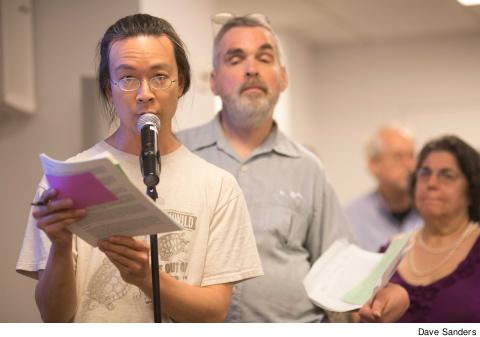 |
At a spirited Delegate Assembly on June 23, delegates and other PSC members debated the tentative contract agreement reached with CUNY on June 16, ultimately deciding to recommend the deal to members for ratification. The vote to put the tentative agreement before the members was an overwhelming 111-11. PSC members have worked under an expired contract for the last six years, receiving no raises as the cost of living in New York City climbed.
President Barbara Bowen opened the assembly by describing some of the key gains made by the PSC bargaining team, starting with a 10.41 percent salary increase that includes back pay, as well as a $1,000 signing bonus. Other wins include multiyear appointments for adjunct faculty, a commitment and timeline for workload reduction for full-time faculty, increased access to higher salary and title for HEOs, increased annual leave for library faculty and a salaried appointment for CLIP and CUNY Start teachers. (See details of the agreement on pages 8-11.)
Urging the DA to recommend the agreement for a ratification vote, Bowen called the deal “worthy of our struggle,” though she described the salary increase as only minimally acceptable, and said that the gains for adjuncts had been in health insurance and job security, not salary equity. “We are still in a period of artificial and enforced and unjustified economic austerity” she said.
ADJUNCT CONCERNS
A vociferous group of adjunct members urged delegates not to send the tentative agreement to the general membership, citing a continuing lack of salary equity between contingent faculty and full-time faculty. “I have to vote no on the contract because it still has not made enough structural change,” said Susan DiRaimo, PSC vice president for part-time personnel. “I’m for unity, but there will not be unity until adjuncts receive a fair wage.”
Marcia Newfield, former chair of the PSC’s chapter for part-time faculty and a member of the bargaining team, took issue with dissenters among the adjuncts. “The three-year appointment is cosmic, not just a little hangnail somewhere,” she said.
Several full-time faculty delegates also took issue with the agreement, including Sigmund Shen, chapter chair at LaGuardia Community College, who has been active in the union’s escalating actions during the contract campaign. “I am not angry at the union,” Shen said, “I am angry at Cuomo.” However, Shen continued, the strike authorization vote, which passed by an overwhelming 92 percent of voting members in May, should be taken as an indication that members are still willing to strike. “If we build toward a strike now, won’t we be in stronger position to organize against tuition hikes in the fall?” he asked.
A HARD-WON CONTRACT
Delegate Berkis Cruz-Eusebio of Hostos Community College wasn’t hearing it. “[If I vote] no for this contract after six years,” she asked, “how do I go back to members and tell them the only thing I can offer you is the possibility of a strike?”
Philippe Marius, a HEO at the College of Staten Island (CSI), asked delegates to vote for what he deemed a less-than-generous contract in terms of the raise in salary, which he said fell just a bit shy of the rate of inflation. “I can vote yes and [when this contract expires], lean out the window and yell, ‘We’re still mad as hell, and we ain’t gonna take it a second time.’”
A historical perspective on the campaign for the contract was brought by Jim Perlstein, who said he began teaching at CUNY in 1959. “This contract fight is the greatest triumph in the history of this union,” Perlstein said.
CSI Chapter Chair George Emilio Sanchez sought to strike a balance. “I am not going to contest any of the voices that have spoken up because I think everyone is in agreement with the criticisms. I want to speak to what got us here, and I want to affirm the fact that we, as a union, need to stick together,” he said. “We need to build on our solidarity; it’s the thing that got us to this point.”

